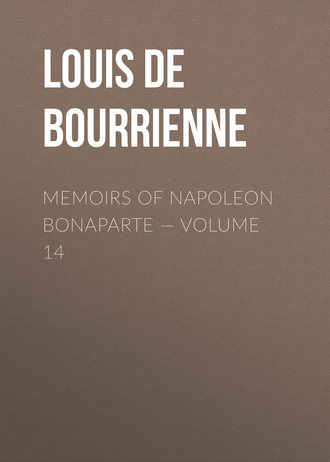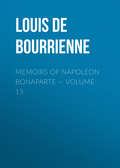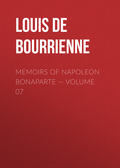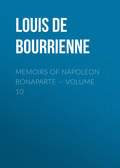
Louis de Bourrienne
Memoirs of Napoleon Bonaparte — Volume 14
But it was not merely the mob that checked the liberalism or constitution of Napoleon, a delicate and doubtful plant in itself, that required the most cautious treatment to make it really take root and grow up in such a soil: Some of his councillors, who called themselves "philosophical statesmen," advised him to lay aside the style of Emperor, and assume that of High President or Lord General of the Republic! Annoyed with such puerilities while the enemy was every day drawing nearer the frontiers he withdrew from the Tuileries to the comparatively small and retired palace of the Elysee, where he escaped these talking-dreamers, and felt himself again a sovereign: Shut up with Benjamin Constant and a few other reasonable politicians, he drew up the sketch of a new constitution, which was neither much better nor much worse than the royal charter of Louis XVIII. We give an epitome of its main features.
The Emperor was to have executive power, and to exercise legislative power in concurrence with the two Chambers. The Chamber of Peers was to be hereditary, and nominated by the Emperor, and its number was unlimited. The Second Chamber was to be elected by the people, and to consist of 629 members; none to be under the age of twenty-five. The President was to be appointed by the members, but approved of by the Emperor. Members were to be paid at the rate settled by the Constituent Assembly, which was to be renewed every five years. The Emperor might prorogue, adjourn, or dissolve the House of Representatives, whose sittings were to be public. The Electoral Colleges were maintained. Land tax and direct taxes were to be voted only for a year, indirect taxes might be imposed for several years. No levy of men for the army nor any exchange of territory was to be made but by a law. Taxes were to be proposed by the Chamber of Representatives. Ministers to be responsible. Judges to be irremovable. Juries to be established. Right of petition, freedom of worship, inviolability of property, were recognised. Liberty of the press was given under legal responsibility, and press offences were to be judged with a jury. No place or part of the territory could be placed in a state of siege except in case of foreign invasion or civil troubles. Finally, the French people declared that in the delegation it thus made of its powers it was not to be taken as giving the right to propose the re-establishment of the Bourbons, or of any Prince of that family on the throne, even in case of the extinction of the imperial dynasty. Any such proposal was formally interdicted to the Chambers or to the citizens, as well as any of the following measures,.viz. the re-establishment of the former, feudal nobility, of the feudal and seignorial rights, of tithes, of any privileged and dominant religion, as well as of the power of making any attack on the irrevocability of the sale of the national goods.
Shortly after the return of Napoleon from Elba, believing it to be impossible to make the Emperor of Austria consent to his wife's rejoining him (and Maria Louisa had no inclination to a renewal of conjugal intercourse), Napoleon had not been many days in Paris when he concocted a plan for carrying off from Vienna both his wife and his son: In this project force was no less necessary than stratagem. A number of French of both sexes much devoted to the Emperor, who, had given them rank and fortune, had accompanied Maria Louisa in 1814 from Paris to Blois and thence to Vienna. A correspondence was opened with these persons, who embarked heart and soul in the plot; they forged passports, procured- relays, of horses; and altogether arranged matters so well that but a for a single individual—one who revealed the whole project a few days previously to that fixed upon for carrying it into effect—there is little room to doubt that the plan would have succeeded, and that the daughter of Austria and the titular King of home would have given such, prestige as their presence could give at the Tuileries and he Champs-de- Mai. No sooner had the Emperor of Austria discovered this plot, which, had it been successful, would have placed him in a very awkward predicament, than he dismissed all the French people about his daughter, compelled her to lay aside the armorial bearings and liveries of Napoleon, and even to relinquish the title of Empress of the French: No force, no art, no police could conceal these things from the people of Paris; who, moreover, and at nearly the same time; were made very uneasy by the failure of Murat's attempt in Italy, which greatly increased the power and political influence of Austria. Murat being disposed of, the Emperor Francis was enabled to concentrate all his forces in Italy, and to hold them in readiness for the re-invasion of France.
"Napoleon," says Lavallette, "had undoubtedly expected that the Empress and his son would be restored to him; he had published his wishes as a certainty, and to prevent it was, in fact, the worst injury the Emperor of Austria could have done, him. His hope was, however, soon destroyed.
"One evening I was summoned to the palace. I found the Emperor in a dimly-lighted closet, warming himself in a corner of the fireplace, and appearing to suffer already from the complaint which never afterwards left him. 'Here is a letter,' he said, 'which the courier from Vienna says is meant for you—read it.' On first casting my eyes on the letter I thought I knew the handwriting, but as it was long I read it slowly, and came at last to the principal object. The writer said that we ought not to reckon upon the Empress, as she did not even attempt to conceal her dislike of the Emperor, and was disposed to approve all the measures that could be taken against him; that her return was not to be thought of, as she herself would raise the greatest obstacles in the way of it; in case it should be proposed; finally, that it was not possible for him to dissemble his indignation that the Empress, wholly enamoured of ——, did not even take pains to hide her ridiculous partiality for him. The handwriting of the letter was disguised, yet not so much but that I was able to discover whose it was. I found; however, in the manner in which the secret was expressed a warmth of zeal and a picturesque style that did not belong to the author of the letter. While reading it, I all of a sudden suspected it was a counterfeit, and intended to mislead the Emperor. I communicated ms idea to him, and the danger I perceived in this fraud. As I grew more and more animated I found plausible reasons enough to throw the Emperor himself into some uncertainty. 'How is it possible,' I said, 'that ——- should have been imprudent enough to write such things to me, who am not his friend, and who have had so little connection with him? How can one suppose that the Empress should forget herself, in such circumstances, so far as to manifest aversion to you, and, still more, to cast herself away upon a man who undoubtedly still possesses some power to please, but who is no longer young, whose face is disfigured, and whose person, altogether, has nothing agreeable in it?' 'But,' answered the Emperor, ——- is attached to me; and though he is not your friend, the postscript sufficiently explains the motive of the confidence he places in you.' The following words were, in fact, written at the bottom of the letter: 'I do not think you ought to mention the truth to the Emperor, but make whatever use of it you think proper.' I persisted, however, in maintaining that the letter was a counterfeit; and the Emperor then said to me, 'Go to Caulaincourt. He possesses a great many others in the same handwriting. Let the comparison decide between your opinion and mine.'
"I went to Caulaincourt, who said eagerly to me, 'I am sure the letter is from ——-, and I have not the least doubt of the truth of the particulars it contains. The best thing the Emperor can do is to be comforted; there is no help to be expected from that side.'
"So sad a discovery was very painful to the Emperor, for he was sincerely attached to the Empress, and still hoped again to see his son, whom he loved most tenderly.'
"Fouche had been far from wishing the return of the Emperor. He was long tired of obeying, and had, besides, undertaken another plan, which Napoleon's arrival had broken off. The Emperor, however, put him again at the head of the police, because Savary was worn out in that employment, and a skillful man was wanted there. Fouche accepted the office, but without giving up his plan of deposing the Emperor, to put in his place either his son or a Republic under a President. He had never ceased to correspond with Prince Metternich, and, if he is to be believed, he tried to persuade the Emperor to abdicate in favour of his son. That was also my opinion; but; coming from such a quarter, the advice was not without danger for the person to whom it was given. Besides, that advice having been rejected, it: was the duty of the Minister either to think no more of his plan or to resign his office. Fouche, however, remained in the Cabinet; and continued his correspondence. The Emperor, who placed but little confidence in him; kept a careful eye upon him. One evening the Emperor: had a great deal of company at the Elysee, he told me not to go home, because he wished to speak to me. When everybody was gone the Emperor stopped with Fouche in the apartment next to the one I was in. The door remained half open. They walked up and down together talking very calmly. I was therefore greatly astonished when, after a quarter of, an hour, I heard the Emperor say to him' gravely, 'You are a traitor! Why do you remain Minister of the Police if you wish to betray me? It rests with me to have you hanged, and everybody would rejoice at your death!' I did not hear Fouche's reply, but the conversation lasted above half an hour longer, the parties all the time walking up and down. When Fouche went away he bade me cheerfully, good-night, and said that the Emperor had gone back to his apartments.
"The next day the Emperor spoke to me of the previous night's conversation. 'I suspected,' he said, 'that the wretch was in correspondence with Vienna. I have had a banker's clerk arrested on his return from that city. He has acknowledged that he brought a letter for Fouche from Metternich, and that the answer was to be sent at a fixed time to Bale, where a man was to wait for the bearer on the bridge: I sent for Fouche a few days ago, and kept him three hours long in my garden, hoping that in the course of a friendly conversation he would mention that letter to me, but he said nothing. At last, yesterday evening, I myself opened the subject.' (Here the Emperor repeated to me the words I had heard the night before, 'You are a traitor,' etc.) He acknowledged, in fact, continued the Emperor, 'that he had received such a letter, but that it was not signed and that he had looked upon it as a mystification. He showed it me. Now that letter was evidently an answer, in which the writer again declared that he would listen to nothing more concerning the Emperor, but that, his person excepted, it would be easy to agree to all the rest. I expected that the Emperor would conclude his narrative by expressing his anger against Fouche, but our conversation turned on some other subject, and he talked no more of him.
"Two days afterwards I went to Fouche to solicit the return to Paris of an officer of musqueteers who had been banished far from his family. I found him at breakfast, and sat down next to him. Facing him sat a stranger. 'Do you see this man?' he said to me; pointing with his spoon to the stranger; 'he is an aristocrat, a Bourbonist, a Chouan; it is the Abbe ——-, one of the editors of the Journal des Debats—a sworn enemy to Napoleon, a fanatic partisan of the Bourbons; he is one of our men. I looked, at him. At every fresh epithet of the Minister the Abbe bowed his head down to his plate with a smile of cheerfulness and self- complacency, and with a sort of leer. I never saw a more ignoble countenance. Fouche explained to me, on leaving the breakfast table, in what manner all these valets of literature were men of his, and while I acknowledged to myself that the system might be necessary, I scarcely knew who were really more despicable—the wretches who thus sold themselves to the highest bidder, or the minister who boasted of having bought them, as if their acquisition were a glorious conquest. Judging that the Emperor had spoken to me of the scene I have described above, Fouche said to me, 'The Emperor's temper is soured by the resistance he finds, and he thinks it is my fault. He does not know that I have no power but by public opinion. To morrow I might hang before my door twenty persons obnoxious to public opinion, though I should not be able to imprison for four-and-twenty hours any individual favoured by it. As I am never in a hurry to speak I remained silent, but reflecting on what the Emperor had said concerning Fouche I found the comparison of their two speeches remarkable. The master could have his minister hanged with public applause, and the minister could hang—whom? Perhaps the master himself, and with the same approbation. What a singular situation!—and I believe they were both in the right; so far public opinion, equitable in regard to Fouche, had swerved concerning the Emperor."
The wrath of Napoleon was confined to the Lower House, the Peers, from the nature of their composition, being complacent and passive enough. The vast majority of them were in fact mere shadows gathered round the solid persons of Joseph, Lucien, Louis, and Jerome Bonaparte, and Sieyes, Carnot, and the military men of the Revolution. As a political body Napoleon despised them himself, and yet he wanted the nation to respect them. But respect was impossible, and the volatile Parisians made the Peers a constant object of their witticisms. The punsters of Paris made the following somewhat ingenious play upon words. Lallemand, Labedogure, Drouot, and Ney they called Las Quatre Pairs fides (perfides), which in pronunciation may equally mean the four faithful peers or the four perfidious men. The infamous Vandamme and another were called Pair- siffles, the biased peers, or the biased pair, or (persiffles) men made objects of derision. It was thus the lower orders behaved while the, existence of France was at stake.
By this time the thunder-cloud of war had gathered and was ready to burst. Short as the time at his disposal was Napoleon prepared to meet it with his accustomed energy. Firearms formed one of the most important objects of attention. There were sufficient sabres, but muskets were wanting. The Imperial factories could, in ordinary times, furnish monthly 20,000 stands of new arms; by the extraordinary activity and inducements offered this number was doubled. Workmen were also employed in repairing the old muskets. There was displayed at this momentous period the same activity in the capital as in 1793, and better directed, though without the same ultimate success. The clothing of the army was another difficulty, and this was got over by advancing large sums of money to the cloth manufacturers beforehand. The contractors delivered 20,000 cavalry horses before the 1st of June, 10,000 trained horses had been furnished by the dismounted gendarmerie. Twelve thousand artillery horses were also delivered by the 1st of June, in addition to 6000 which the army already had.







